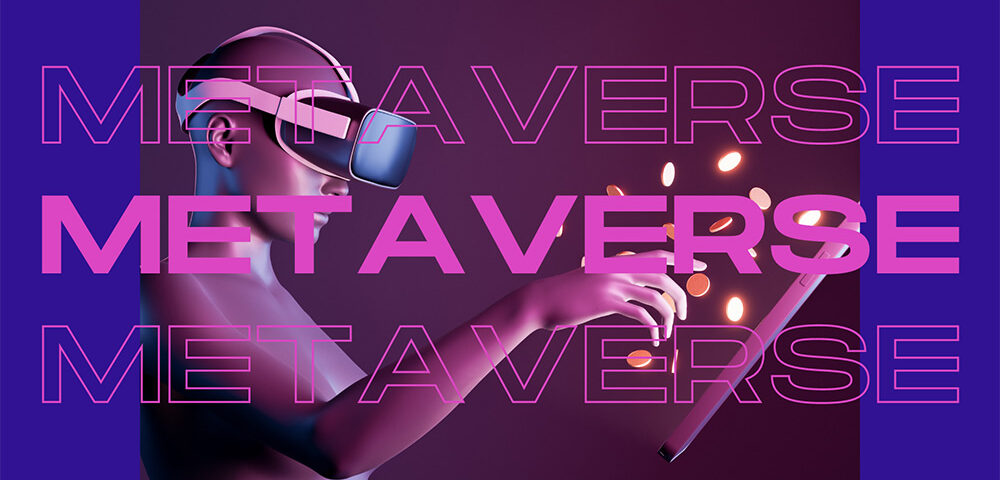
What Makes a Good Web Development Company
March 25, 2022What’s all the buzz about Metaverse – the virtual environment that is poised to revolutionize the technology industry? Let’s speak about the growing popularity of metaverse development, the future of metaverse, and why it is the next great thing!
Evolving technologies actively monitor our preconceived beliefs, with new imaginative applications in a wide range of industries. For instance, the internet has revolutionized the way individuals communicate with one another. We have internet connectivity almost wherever we go. Metaverse enables people to perceive the internet as a 3D space and communicate with it.
The popularity of metaverse and discussions about its future have increased after Mark Zuckerberg, the CEO of Facebook, rebranded Facebook to Meta. Individuals have begun to construct numerous metaverse representations depending on their metaverse knowledge.
The Revolutionary Moment
The metaverse debate reached a critical juncture shortly after Facebook announced its plan for metaverse development. Surprisingly, Facebook recently sailed into the huge ocean of the metaverse. Several other firms, in addition to Facebook, have tapped into the metaverse space. However, because companies have begun to invest extensively in metaverse development, Facebook has unquestionably fueled the growth of metaverse.
What Is Involved in the creation of Metaverse?
The factor that is paramount to the growth of metaverse is the assumption that “metaverse is the new internet”. Is this a reasonable assumption? For the metaverse to grow, it must have a utility.
How will the metaverse evolve and how will individuals be able to engage in it? The metaverse, as we all know, is a virtual world where people can communicate with others. When the metaverse’s technical origins are probed, the metaverse, regardless of how easy it looks, is far more intricate.
As a consequence, in order to comprehend the metaverse’s future potential, you must first understand the key layers in its structure.
The following elements are crucial to the formation of the metaverse:
The Infrastructure
The primary element in establishing the metaverse is to build the fundamental infrastructure using networking technologies. Without internet technologies like 5G and WiFi, it is impossible to imagine interconnected virtual environments. Furthermore, cloud, as well as computing resources, are necessary to build the metaverse’s infrastructure.
The Human Interface
A concept like “metaverse is the next big thing?” captivate people’s attention and steer them towards the metaverse space. How will humans gain access to the metaverse? Without users, the metaverse would be an empty virtual space. As a result, the metaverse necessitates a human interface component that is supported by a variety of technologies. Ingenious technologies like haptics, VR headsets, AR glasses, and more are some of the tools that will enable individuals to engage with the metaverse.
Decentralization
The interplay of metaverse blockchains is also important for the future of metaverse. Nobody can control the metaverse like no one has control over the real world. The Metaverse can grow into a democratic ecosystem, with blockchain serving as the necessary infrastructure to improve decentralization. Furthermore, technologies like artificial intelligence and edge computing have the potential to give humans complete metaverse sovereignty.
Spatial Computing
The discussions on the metaverse’s future emphasize the development of another 3D reality identical to the physical world. As a result, for the production of 3D environments, complicated modeling frameworks and 3D visualization are necessary. As a result, spatial computing will play a critical role in contributing to metaverse growth through interactive solutions.
Exploring
Another key feature that will decide the growth of the metaverse is the element of discovery. Users may easily navigate the metaverse, thanks to the fundamental metaverse functionalities. As a result, the metaverse will require a dependable and effective content engine capable of generating engagement. The interaction component of the metaverse also includes social media, ratings, ads as well as reviews.
Creator Economy
The establishment of a creator economy would be the most significant distinction between the metaverse and other digital worlds. Users will be able to mint NFTs and exchange them across multiple digital locations. The future of the metaverse will be significantly dependent on how effectively it developed the creator’s economic function. For the metaverse’s creative economy, you’d need a set of design tools, as well as digital assets along with a variety of e-commerce enterprises.
Experience
Another element that will determine the future of the metaverse is the diverse experiences that individuals may have with it. It’s worth mentioning that metaverse experiences are simply virtual reality versions of programs you’re already familiar with. Consider using and experiencing your favorite game in 3D.
The Current State of the Metaverse Market
A majority of people are eager to revert to the question, “Whether metaverse is the future of the internet?” without taking into account the prevailing position of the metaverse. How many projects are you currently working on? Is it true that certain well-known people are investing in the metaverse? One great example is Facebook. And, what about other remaining IT behemoths? Well, even if there is no one owns the metaverse, it must be created by a diverse group of organizations, artists, and technologists. Furthermore, the acceptability of the metaverse is greatly contingent on the names associated with it. Let’s discuss a few of the prominent corporations who have already declared as starting of their attempts to construct the metaverse.
Many IT experts interpreted Facebook’s declaration about the metaverse as a marketing gimmick. Moreover, it is vital to evaluate how a digital giant such as Facebook may make a bigger future vow for the metaverse sector. Surprisingly, Facebook possesses nearly all of the infrastructure required to construct the metaverse, from infrastructure to human interface to discovery. Facebook is home to Oculus VR headsets, a big social media ad engine, and a thriving creative economy.
Microsoft
Microsoft’s attempts to construct the metaverse cannot be dismissed. Indeed, the collaborations of firms like Microsoft lend credence to queries like whether the metaverse is the subsequent giant thing? Microsoft Mesh is Microsoft’s commitment to creating a metaverse that is completely work-centric. It would create a highly digital atmosphere in which customers could easily connect to various Microsoft goods.
Epic Games
Many IT experts interpreted Facebook’s announcement regarding the metaverse as a marketing gimmick. However, it is vital to evaluate how a digital giant such as Facebook may make bigger future promises in the metaverse sector. Surprisingly, Facebook possesses all the infra required to construct the metaverse, right from the infra to the human interface to discovery.
Decentraland
Decentraland was the first to venture into metaverse development and offer the metaverse as a key service. Decentraland, which debuted in 2017, enables users to develop NFTs and trade in the virtual real estate industry. Surprisingly, Decentraland’s virtual real estate was sold at auction for $2 million-plus. As a result, Decentraland seems among the most prominent names in the future of the metaverse.
Metaverse and its Possibilities
The possibilities associated with the metaverse’s emergence as the new internet are the final component that may enhance your feeling of its impending advent. The many ways to connect with the metaverse will have a huge effect on how it evolves in the coming era. We have mentioned a few main potentials for value enhancement that could link the metaverse across a variety of sectors.
- The metaverse provides up a whole new world of completely unique, imaginative, and different marketing chances.
- Various Metaverse technologies like Microsoft Mesh may enable the formation of 100% customized virtual workplaces in near future.
- The next intriguing metaverse use that may gain popularity is virtual tourism. Application of both AR, VR technologies may aid in the formation of realistic worlds in which users can interact with authentic material.
- Remote learning is becoming increasingly popular, and the future of metaverse may provide great potential for developing possibilities in this discipline. Universities have begun to employ virtually abled worlds like Minecraft and Second Life for convocations. Simultaneously, virtual reality simulations may aid students all around the world in improving their learning experiences.
Wrapping It Up
A transparent picture of the metaverse’s potential reveals bright possibilities for the future. If you’ve been wondering if metaverse is the next big thing, you need to know that undoubtedly it is a significant technological intrusion. Indeed the metaverse is competent enough to transit the way people communicate, play different games, and work together.


